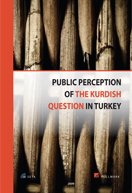The escalation in attacks by the Kurdistan Workers’ party (PKK) on Turkish troops and civilians has brought Turkey to the brink of war with the Kurdish authorities in northern Iraq. Recep Tayyip Erdogan, the Turkish prime minister, has declared that unless action is taken against the PKK, Turkey will act unilaterally. Despite the intensifying rhetoric, however, the crisis may be an opportunity to find a lasting solution to the Kurdish problem in Turkey and the region
In the 1980s, the PKK advocated independence and launched bloody attacks on Turkish troops and civilians. While the fighting continued in the 1990s, the PKK changed its demands from independence to political and cultural rights. By 1999, when the PKK leader Abdullah Ocalan was captured, the war bill was horrific: more than 35,000 dead, tens of thousands wounded, hundreds of thousands displaced and billions of dollars in military spending and damages.
After his capture, the PKK leader rejected secessionist aspirations and promised to keep the group under control. Yet PKK fighters increased their presence in northern Iraq. After the US invasion of Iraq in 2003, most of the Iraqi territories under the Kurdistan Regional Government (KRG) became a haven for PKK operations.
The current stand-off between Ankara, Iraqi Kurds and Washington is more than a result of failed diplomacy. Mr Erdogan’s AK party government can no longer resist pressures to launch operations into northern Iraq. With the motion passed in the Turkish Grand Assembly on October 17, the government has a mandate for military action and will be forced to use it. The central Iraqi government of Nouri al-Maliki is willing to do something about the PKK but does not have the ability to do so. Given the federal structure and the political realities of Iraq, the al-Maliki government is dependent on the Kurdish leaders. The KRG leaders, on the other hand, are capable of doing something but not willing, because they want Turkey to recognise their rule and accept the annexation of oil-rich Kirkuk into the KRG, which Turkey opposes. The inflammatory rhetoric and inaction from Iraq’s Kurdish leaders only exacerbate the problem.
The use of military force in northern Iraq might be a short-term measure to contain the PKK and quell public outrage in Turkey. It has, however, potentially damaging consequences for Turkey’s long-term relationship with the Kurds in Iraq. Nation-building in the KRG can easily turn into an anti-Turkish national mythology. An Iraqi Kurdish national identity based on animosity to Turkey will have implications for the Kurds of Turkey as well.
Ethnic-sectarian identity politics, which has been ravaging Iraq since 2005, can spill over borders. If Turkey were pulled into a prolonged conflict with the Kurds of Iraq, the Kurdish question could become a regional problem, forcing Iran, Syria and other Arab countries into the fray. A Kurdish political entity supported primarily by the US and Israel would only isolate the Iraqi Kurds.
There is a solution to the Kurdish problem in Turkey. Turks agree on the need to end PKK terrorism. The July 22 elections showed that the overwhelming majority of Turkish Kurds desire a political settlement to the Kurdish problem. The PKK, which has been losing its social base among the Kurds in both the rural areas and big cities, has neither given the Kurds a sense of identity nor made their daily life better. Furthermore, the recent attacks make no sense as they are not followed up by any specific demands.
While the differences between the Turkish political and military establishments continue, a consensus seems to be building on the need to do what it takes to address the causes of PKK terrorism. This involves questioning the failed policies of the Turkish state to create social cohesion. The social capital that has united Turks and Kurds has been largely ignored by the state to maintain exclusive control over the identity claims of its citizens. Turkey can reclaim its Kurdis









